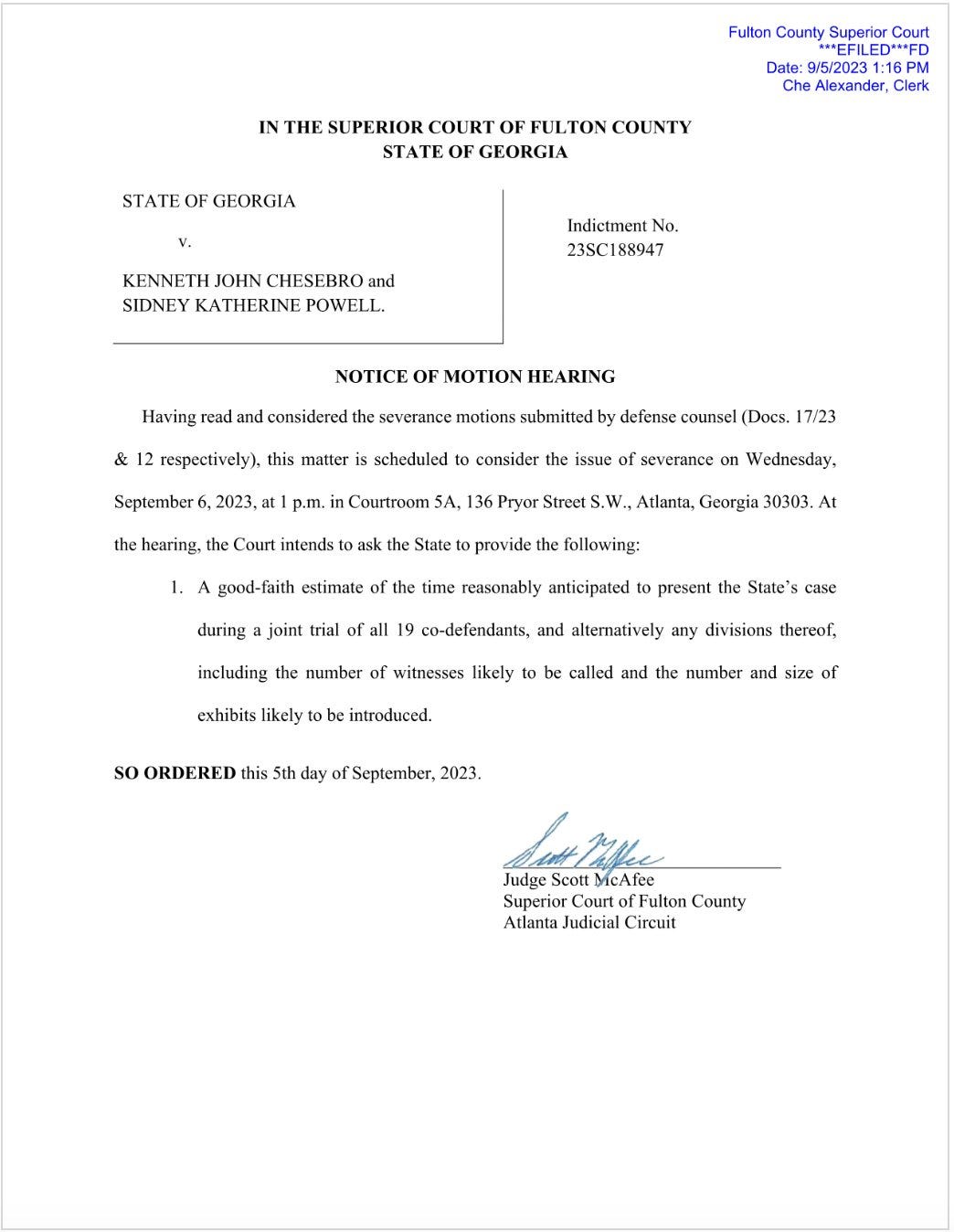Motions to Sever: When you don't want to go to trial alongside people you committed crimes with.
On Wednesday afternoon at 1:00p.m. Judge Scott McAfee, the Fulton County, Georgia, state court judge assigned to the RICO prosecution of Donald Trump and his 18 co-defendants, will hear argument on motions to sever by two of them. Defendants Kenneth Chesebro, a lawyer, and Sidney Powell, another lawyer, want their cases tried separately from those of other defendants. And even though they’ve both asked for speedy trials, they don’t want to be tried with each other.
Of course, this isn’t how it works. We’ll discuss the law and what to expect below. I’ve linked to some of the actual Georgia cases, if you want to take a look at the law.
But interestingly, the Judge has also asked the Fulton County district attorney to provide trial time estimates if there is a joint trial of all 19 defendants, and if there are different groupings. This could just be a matter of the judge wanting to get his calendar straight. It’s likely we’ll learn more in the hearing tomorrow, which, like all proceedings in this case so long as it remains in state court, will be publicly accessible.
If you want to read the principle documents for yourself, you can find them at these links:
Chesebro's motion to sever his trial from Powell’s
Chesebro devotes a lot of ink to explaining that he doesn’t know Powell, has never sent her an email, or a text, or even communicated with her on social media. Powell is identified in the overt acts in the indictment as one of the key players in the scheme to infiltrate voting machines in Coffee County, Georgia. Chesebro pulls out an “I’ve never been to Coffee County, Georgia” defense. It would be a nice title for a country song, but it’s not a very good argument to sever the cases. Ultimately, the best approach if you don’t want to be tried with someone is not to commit crimes with them.
Chesebro’s lawyers make the right types of argument under Georgia law. They argue that their client will be prejudiced if his case is not severed because evidence will come in against Powell that will dirty him up (as criminal lawyers say) too. They also argue that their defenses may be “antagonistic” to each other, meaning that they may be in conflict and that could also turn the jury against them. “Simply put, if Mr. Chesebro and Ms. Powell are forced to be tried together, the State will attempt to lump them together in an attempt to convict Mr. Chesebro via a “conspiracy” or “RICO” theory based on the conduct of the co-defendant which has no relation to anything for which he stands accused.”
But of course, that’s the problem with the argument. Chesebro, like Powell and all of the others, does stand accused of a RICO conspiracy, and in conspiracy cases, evidence regarding co-conspirators is admissible against the others. Simply put, Georgia courts have held that defendants aren’t entitled to severance just because it might give them a better chance of getting acquitted. It’s not enough to have antagonistic defenses, there must be a showing of harm to the defendant’s rights.
The Georgia Supreme Court has held for decades that a defendant seeking severance must make a clear showing that he will be harmed or prejudiced in the absence of a severance. Not any kind of small harm will do; the defendant has to show that it amounts to a denial of due process. So a defendant must persuade the court that trying him alongside a particular co-defendant “hinders a fair determination of each defendant's guilt or innocence.”
That means Chesebro and Powell must do more than make assertions about theoretical harms. They’ll need to convince the judge that they will actually be prejudiced if evidence about one defendant’s conduct—say Trump’s phone call to Brad Raffensperger—is introduced in their trial. That will be difficult in this case, although it’s not impossible that some specific difficulties could emerge. But, at bottom, it is not error for a judge to decline to grant a motion to sever where a defendant fails to demonstrate how evidence being introduced against other defendants prejudiced them. This gives Judge McAfee enormous discretion over how to handle the 19 defendants in the case.
Of course, Donald Trump has also moved to sever. But in his case, the grounds are that he does not wish to be tried with the speedy trial request defendants. That’s a reasonable request, even though it’s consistent with Trump’s overall strategy of trying to delay every proceeding in each of the four cases he’s indicted in for as long as possible. He argues that an October 23 trial date doesn’t give him time to prepare and that the problem is made worse because his new lawyer, Atlanta criminal defense lawyer Steve Sadow, has a trial set a month earlier that’s expected to last 2-3 weeks. (Ironically, Sadow’s case is in front of Judge Aileen Cannon, who is presiding over the Mar-a-Lago case.)
Tomorrow, we’ll get a glimpse of how the Judge will handle this complicated proceeding, with lots of moving parts. As it moves forward, it’s very likely that some defendants will drop out of trial with guilty pleas or cooperation agreements, and some of the complications will fade away. But the case will always present the complications inherent in being one of the first criminal trials of a former president.
It’s possible that the Judge will devise two groups of defendants, the speedy trial group and then a later group, each to be tried together. It’s clear from his order asking the district attorney to advise him about trial times under different scenarios that he’s contemplating how to make it all work. And although the Judge has drawn some skepticism because he’s new to the bench, he’s an experienced state and federal court prosecutor, with over a decade of experience. It should be interesting to get his measure tomorrow when we’re able to view the hearing. I’m delighted that there will be cameras in the courtroom—an enormously positive step for these proceedings.
We’re in this together,
Joyce







Joyce, you write the best zingers! Here's a keeper: "Ultimately, the best approach if you don’t want to be tried with someone is not to commit crimes with them." Thanks for helping us through the legal jungle.
While I will join in thanking Joyce, it is appropriate to make clear why the gratitude. Joyce, you are providing great insights for people like me who know nothing about the intricacies of such court case. Even where there is clarity there are always more questions than answers as we wait for the next shoe to drop or to learn about how the dynamics might play out with a cast of RICO defendants and a mix of judges with talents and nuanced perspectives.
Thank you. Yes! “We are in this together.”